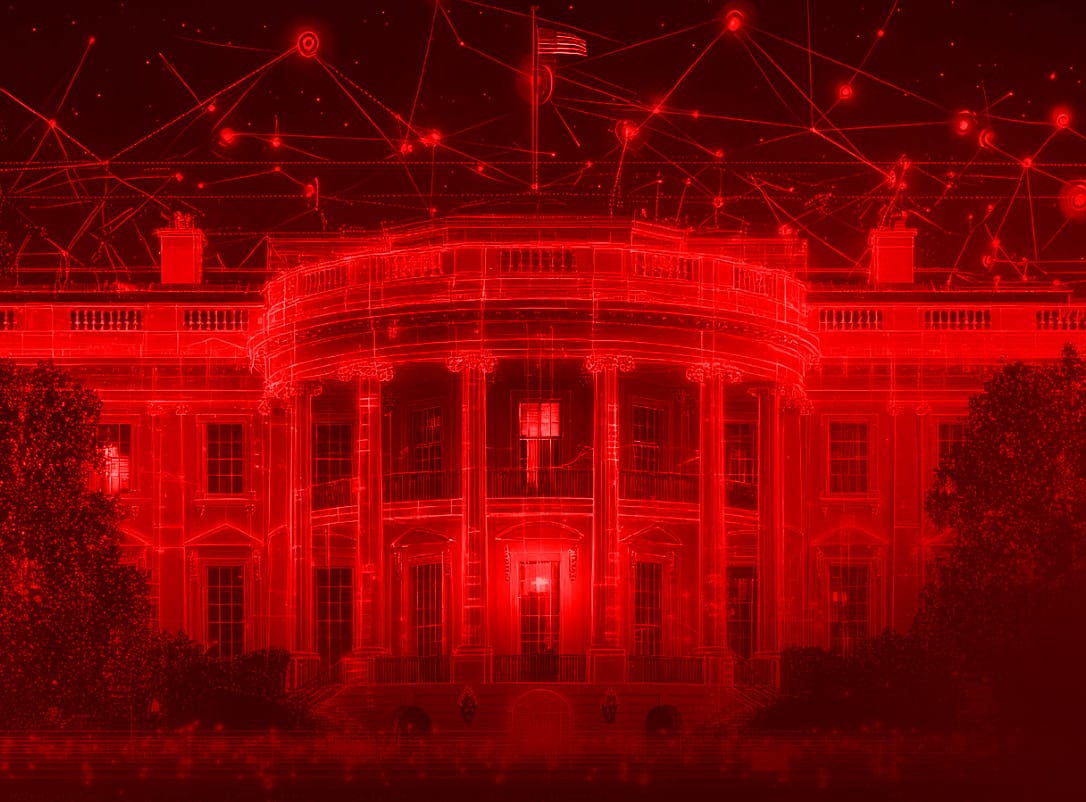White House Digital Assets Report Deems Financial Privacy "Primary Money Laundering Concern"
The White House Digital Assets Report asks the Treasury to finalize a rule that would codify all transactions that obfuscate the source of funds as a "primary money laundering concern".

On Wednesday, the White House published its long anticipated Digital Assets Report, clarifying what policies it urges the Treasury to take to solidify its digital assets regime.
Many expressed disappointment that the report lacks clarity on how much bitcoin the US Government owns. Earlier in July, The Rage published the number of bitcoin owned by the US Marshal Service based on a Freedom of Information Request, stirring controversies over what was largely expected to be a bitcoin stack of ~200,000 BTC. From our reporting, it became clear that the Government's bitcoin stockpile may be much smaller than anticipated, as reports on the bitcoin owned appeared to not distinguish between bitcoin seized, and bitcoin forfeited. To our surprise, that the US Marshal Service was only in possession of ~30,000 BTC appeared to be such big news, that it even made it onto Senator Cynthia Lummis' desk – who wrongfully interpreted it as the Government selling off coins.
Despite its apparent lack of a strategy to establish a Strategic Bitcoin Reserve, the Digital Asset Report is still widely celebrated to solidify Trump's "Golden Age of Crypto," containing guidance on tax exemptions, Stablecoin regulation, and kind words for self-custody. But a closer look at the report suggests that the coming age of "crypto" may not be so golden after all – calling for the application – and expansion – of the PATRIOT Act, the implementation of digital identities for DeFi services, as well as the addition of new sub-categories to the Bank Secrecy Act.
Finalizing the Patriot Act "Mixer" Rule
According to the report, the White House is very concerned with how "illicit actors, such as [Democratic People's Republic of Korea] and ransomware actors, continue to use mixers to obfuscate and launder funds."
In 2023, the Financial Crimes Enforcement Network (FinCEN) proposed a rule that would require financial institutions to monitor and report transactions involving cryptocurrency "mixers". The White House now urges FinCEN to finalize its Biden-era "mixer" rule, which applies Section 311 of the PATRIOT Act to certain cryptocurrency transactions.
FinCEN's "mixer" rule would deem any transaction facilitated in a manner that obfuscates the source, destination, or amount involved in one or more transactions a "primary money laundering concern", regardless of the type of protocol or service used, such as:
- pooling or aggregating [cryptocurrency] from multiple persons, wallets, addresses, or accounts
- using programmatic or algorithmic code to coordinate, manage, or manipulate the structure of a transaction
- splitting [cryptocurrency] for transmittal and transmitting the [cryptocurrency] through a series of independent transactions
- creating and using single-use wallets, addresses, or accounts, and sending [cryptocurrency] through such wallets, addresses, or accounts through a series of independent transactions
- exchanging between types of [cryptocurrency] or other digital assets
- facilitating user-initiated delays in transactional activity
Which means that FinCEN's "mixer" rule is not really a mixer rule, but really a rule that would criminalize any attempt at privacy on a transparent blockchain.
Notably, the White House's recommendation to finalize FinCEN's "mixer" rule stands in stark contrast to its promises to protect self-custody, individual liberty, and the privacy of cryptocurrency users, which it highlights numerous times throughout its report.
The White House specifies that a guiding principle for the protection of self-custody should be the lawful peer-to-peer transmission of digital assets with another individual who lawfully self-custodies digital assets.
"Illicit actors may [...] use DeFi services, along with self-custody, to facilitate peer-to-peer transactions in the laundering process. While there are licit reasons to self-custody digital assets [...], illicit actors can use the pseudonymity of self-custody and peer-to-peer payments to conceal or to quickly move proceeds," the report states.
To bring this into current context, Section 311 of the PATRIOT Act is also the source of 18 USC §1960(B)(1)(c) that criminalizes the transfer of illicit proceeds, to which Samourai Wallet developers Keonne Rodriguez and William Hill plead guilty last morning to avert a potential 25-year prison sentence.

Expanding the PATRIOT Act and the BSA to Apply to DeFi
The PATRIOT Act, introduced post-September 11th under President George W. Bush, authorizes the Treasury to implement special measures to combat the financing of terrorism. At the moment, there are five special measures the Treasury may prescribe, spanning increased information collection and reporting obligations, as well as the denial of service for specific actors.
To "protect the US Financial System" as well as the "US digital assets ecosystem," the White House now recommends to "add a sixth special measure to Section 311 authorizing FinCEN to prohibit, or impose conditions upon, certain transmittals of funds. [...] This would enable Treasury to target foreign digital asset exchanges or digital asset transactions involving criminal or state actors—without regard to the nature of their illicit activity."
Again, this contrasts starkly with other sections in the report, where the White House reverses a FinCEN rule making that requires digital assets transactions over $10,000 to be reported, as well as FinCEN's "unhosted wallet rule," which was actually already withdrawn under the Biden administration in 2024.
The White House states that "control" should be a defining factor for whether digital assets service providers qualify as money transmitters and therefore fall under Bank Secrecy Act (BSA) obligations, but at the same time states that FinCEN's 2019 guidance is not sufficient and should potentially be rescinded. Instead, it recommends that Congress should define asset-specific sub-types to be amended to the BSA, and that the Treasury, at the direction of Congress, should consider "specified [BSA] obligations to actors in the DeFi ecosystem based on the role that they play and the attendant risks."
Why? Because "the ability to transfer assets quickly across borders and perceptions of anonymity, which appeal to many digital asset users, also make digital assets attractive to illicit actors." While highlighting that illicit actors, such as North Korea, only make up a small portion of digital asset users in overall market capitalization, it also highlights the need to combat such actors, noting that such actors often "exploit [...] digital asset service providers that fail to comply with applicable AML/CFT and sanctions obligations, and anonymity-enhancing technologies."
Specifically, the White House tasks legislators to "consider specifying actors within the decentralized finance ecosystem that should have AML/CFT obligations, taking into consideration those actors’ roles in the ecosystem and attendant risks." This suggestion is specifically notable in light of the report's overall tone regarding what it describes as DeFi and privacy preserving technologies.
The report again highlights illicit actor's use of "mixers, anonymity-enhanced cryptocurrencies (AECs), and chain-hopping—to obfuscate transactional information that may be otherwise viewable on public blockchains," adding that "these tools and methods can hinder law enforcement investigations" and can "heighten illicit finance risks if they do not simultaneously allow for or promote risk mitigation measures."

Implementing Digital Identities: From Permissonless to Permissioned
One of such risk mitigating measures are digital identities, the White House states.
"These tools could potentially be used by regulated digital asset intermediaries to support onboarding or by a DeFi services’ smart contracts to automatically check for a credential before executing a user’s transaction," the White House states. "These tools could also potentially incorporate a user’s transaction history on the public blockchain into their identity profile, providing additional information to digital asset intermediaries and other counterparties on a user’s behavior and exposure to illicit finance risks."
While the White House notes that some of these tools leverage ZeroKnowledge Proofs to "to confirm that their identity has been verified or subject to screening by a third party without revealing underlying personal information," it also states that "access to underlying personal information could be allowed at the user’s request or with their permission."
Ultimately, the implementation of digital identities would turn a permissionless system into a permissioned system, even if privacy-preserving measures are taken.
Independent journalism does not finance itself. If you enjoyed this article, please consider making a donation. If you would like to note a correction to this article, please email corrections@therage.co








